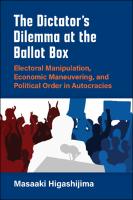The Dictator's Dilemma at the Ballot Box
External Review of Whole Manuscript
Electoral Manipulation, Economic Maneuvering, and Political Order in Autocracies
Author(s)
Higashijima, Masaaki
Collection
Knowledge Unlatched (KU)Language
EnglishAbstract
Contrary to our stereotypical views, dictators often introduce elections in which they refrain from employing blatant electoral fraud. Why do electoral reforms happen in autocracies? Do these elections destabilize autocratic rule? The Dictator’s Dilemma at the Ballot Box argues that strong autocrats who can garner popular support become less dependent on coercive electioneering strategies. When autocrats fail to design elections properly, elections backfire in the form of coups, protests, and the opposition’s stunning election victories. The book’s theoretical implications are tested on a battery of cross-national analyses with newly collected data on autocratic elections and in-depth comparative case studies of the two Central Asian republics of Kazakhstan and Kyrgyzstan.


 Download
Download Download
Download Web Shop
Web Shop